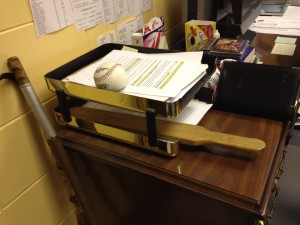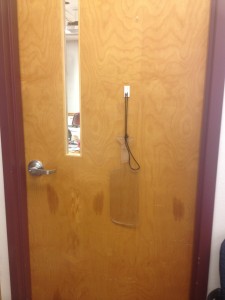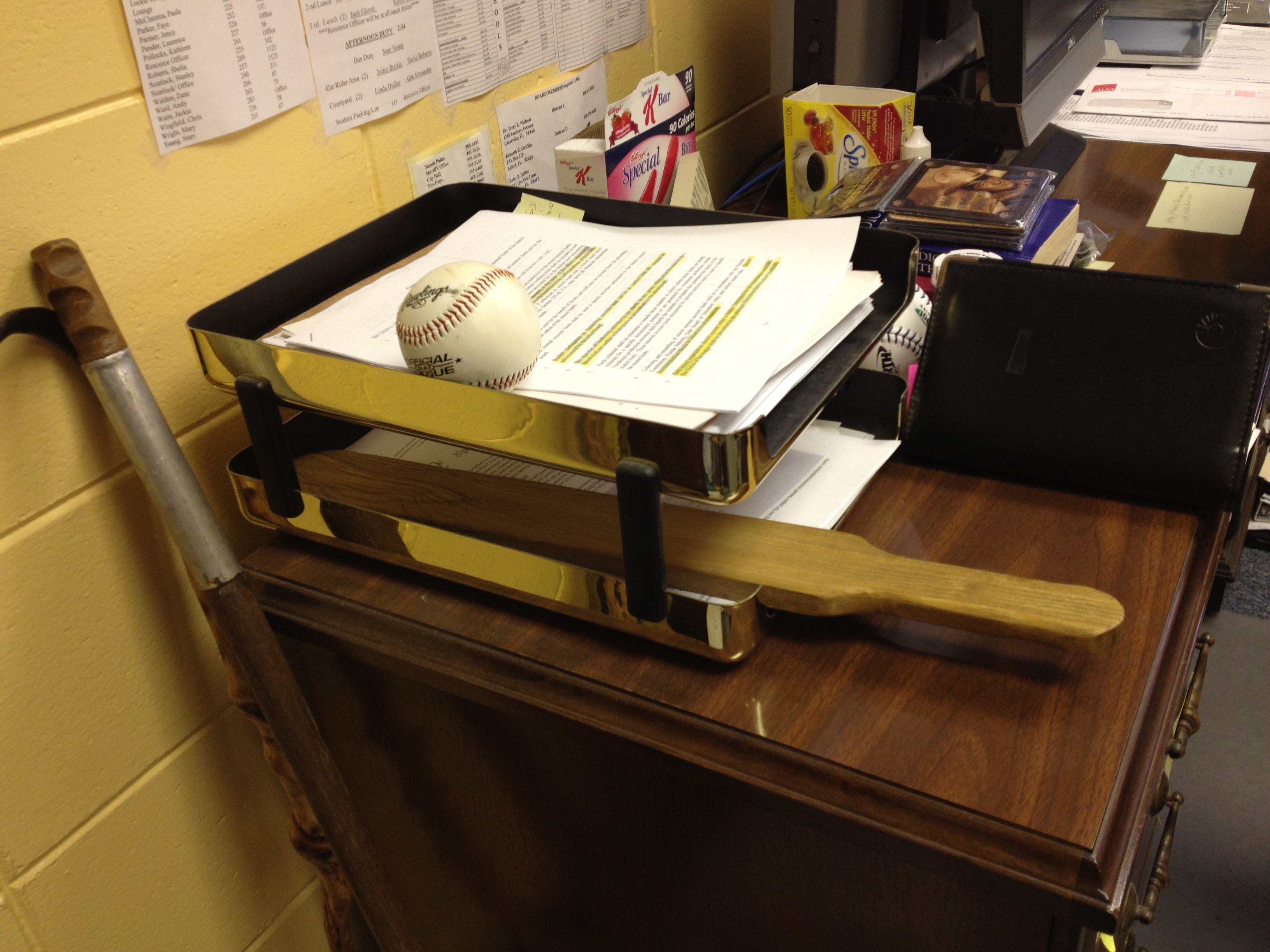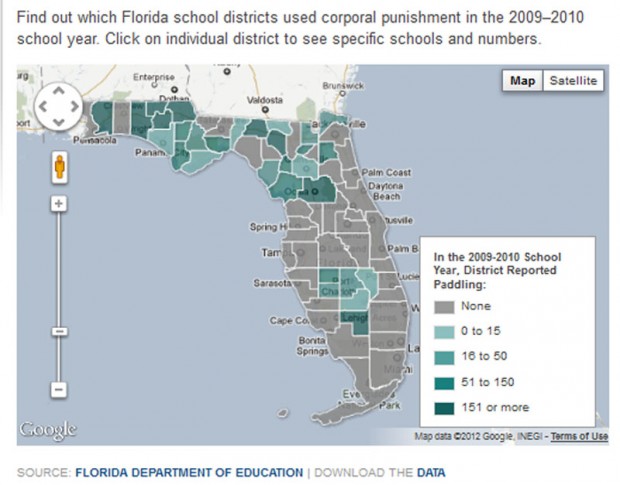Why Florida Schools Want the Right to Paddle Misbehaving Students

Sarah / Gonzalez
The wooden paddle sits on the principal's desk at Sneads High School in Jackson County, Fla.
Spanking in school may seem like a relic of the past.
But in Florida, students from preschoolers to high school seniors are still being paddled by teachers and principals.
In parts of the state, mostly in the rural north, getting spanked at school, on your butt, with a wooden or fiberglass board, is just part of being a misbehaving student.
“I been getting them since about first grade,” said Lucas Mixon, now a junior at Holmes County High School in Bonifay, Fla.
“It’s just regular. They tell you to put your hands up on the desk and how many swats you’re going to get.”
Florida is one of 19 states that still allow public schools to paddle, according to the Center for Effective Discipline.
The most recent data show that 3,661 students were spanked in 2010, according to the Florida Department of Education.
Most school districts in Florida have opted out of using corporal punishment. But almost all counties in rural north Florida have policies to allow schools to paddle students.
State Rep. Ari Porth, a Democrat, sponsored a bill to ban school corporal punishment statewide.
He said where students live should not determine whether they get spanked at school.
“I got my butt beat and I know what’s right and wrong. And my children are going to know what’s right and wrong.”
– Bud Glover, parent in Bonifay, Fla.
“When I heard that this practice still exists, I was mortified,” Porth said. “No child should not feel completely safe when they go to school.”
But the bill failed. It never even reached a committee in the Florida Legislature.
And that’s just fine for parents like Bud Glover of Bonifay, a small town 15 miles from the Alabama border.
It’s a place where tradition is valued and paddling is considered tradition.
“I got my butt beat and I know what’s right and wrong. And my children are going to know what’s right and wrong,” Glover said.
Glover represents the feelings of many parents in this part of Florida who support such punishment.
“I think the problem with society is we quit paddling.”
He says the state should not tell parents in his small town how to discipline their children.
But in South Florida, student Camila Cacho, a junior at Miami Beach High School is astonished that the state still allows the practice.
“That’s so dumb, why would we allow people to hit students?” Cacho said. “I would feel embarrassed. That’s degrading.”
Students Make Paddles in Wood Shop
The instrument often used in school spankings is a wooden or plexiglass paddle.

Sarah Gonzalez / StateImpact
Holmes County High School principal Eddie Dixson with senior Cole Long. Long thinks all schools should paddle students to teach kids "discipline and respect."
There are no statewide regulations on what the paddles should look like, so each school district creates its own.
The paddle at Holmes County High School looks like a really short rowboat paddle. It’s about 16 inches long, 5 inches wide and a half an inch thick.
You can’t buy them at a store, so Holmes County High asks woodshop students to make them.
Senior Cole Long has never made a paddle, but he’s been on the receiving end of one.
He says he’s been paddled for things like “throwing papers, throwing pencils, a couple times for cussing, back-talking.
“I used to be a really wild child,” he said.
A couple of months ago, Long won $7,200 at a bull-riding competition in Texas. But even for a bull-rider, Long says the paddle stings—depending on who’s doing the spanking.
“The assistant principal, he hurts, he hurts,” Long said. “I’ve had it plenty of times from him and he gives it to us a little bit more.”
Long thinks all schools should paddle students because he says the spankings teach students discipline and respect. And much of the community agrees.
Paddling without Parental Consent
But every once in a while, a parent from one of these small towns will object, like Tenika Jones of Levy County.
Last year, the principal at Joyce Bullock Elementary sent home a waiver asking parents for permission to paddle students.
Jones says she didn’t sign it. But her son, Geirrea Bostick, was paddled anyway.

Sarah Gonzalez / StateImpact Florida
Gierrea Bostick, 6, was paddled on his second week of pre-school without the consent of his mom, Tenika Jones. The paddles allegedly left welts on Gierrea's bottom and Jones has filed a notice to sue the Levy County School District.
He was five at the time. It was his second week of pre-school.
Gierrea says the principal spanked him twice for slapping another boy on the school bus. He says the principal first told him to take his jacket off.
“Then she spank me on my booty,” Gierrea said.
“I cried all the way home. It was really hard.”
Gierrea’s mom says the paddling left welts on Gierrea’s bottom and she was outraged.
“If I would have hit my son how she hit him, I would have been in jail, I would have been on the news, I would have been messed up trying to get my children back,” Jones said.
“She whipped him up and to me that’s child abuse.”
Jones has filed a notice to sue the Levy County School District for paddling her son without her permission.
But Robert Rush, a civil right attorney in Gainesville, says state law does not require schools to get parental consent.
“If the school board and the principal specifically authorize corporal punishment, it can be administered lawfully against the parents’ wishes,” Rush said.
Rush says the school principal sets the policy for paddling. And if the school acts in accordance with that policy, then “it’s very hard to sue them,” he said.
“They’re immune both civilly and criminally by law.”
But Rush says attorneys could argue excessive force was used.
The school’s principal, Jamie Handlin, and the school district would not comment because they’re in pre-litigation.
But Handlin told the Williston Pioneer newspaper, “Nothing was violated.
“I disciplined out of love not anger,” she said.
Supporters: Paddling Keeps Kids in School
Schools are the only public institution where hitting is allowed. It’s not allowed in prisons, hospitals, mental institutions or the military.
The most recent statistics show that 223,190 students in the U.S. received corporal punishment in 2006, according to the Center for Effective Discipline.
But school corporal punishment in general has been on the decline.
New Jersey was the first state to ban school corporal punishment, in 1867.

Sarah Gonzalez / StateImpact Florida
The paddle at Madison County Central elementary and middle school hangs on the door of the principal's office, though he does not administer the punishment himself. The plexiglass paddle was made by a member of the community.
The next state, Massachusetts, didn’t follow until more than 100 years later, when child protection laws started popping up and paddling students starting falling out of fashion.
New Mexico is the most recent state to ban paddling. The ban passed just last year.
Deborah Sendek, a clinical child psychologist with the Center for Effective Discipline, says many studies on school corporal punishment show paddling does not deter students from misbehaving.
“What we tend to see is the students who are paddled are paddled repeatedly throughout the course of the academic year and the following year and the following year,” Sendek said. “That’s one of the things that tells us it’s not effective.”
And Sendek says paddling can have negative short and long term physical and psychological consequences.
“The rule in school may be that we only hit for certain things and we only hit with a paddle,” Sendek said. “But if we have a culture where we believe it’s okay to hit, then it can be generalized.”
But supporters of school corporal punishment argue that paddling keeps kids in school, because the alternative for students with bad behavior would be suspension.
Willie Williams, principal at Madison County Central elementary and middle school, agrees.
The only problem is he can’t bring himself to administer the punishment. And when others do it, he says he can’t watch.
“I’m a softy, really, at heart,” Williams said. “I actually have to walk out.”
As principal, Williams could ban the practice at his school. And Williams said he would, “if I believed in that. But I am a part of the community.”
And Williams says this community supports school corporal punishment. And in rural Florida, that’s not likely to change anytime soon.
You can hear why Florida schools can paddle students against parents’ wishes here.


